What Type Of Dental Implant Option Is Right For Me?
Benefits of Dental Implants
Dental Implants can come in a wide variety of options, including single, multiple, or full mouth. They can have a vast range of benefits, such as:
– Natural Appearance: Dental implants closely resemble natural teeth, providing a lifelike appearance and restoring confidence in your smile.
– Enhanced Function: Implants restore chewing function, allowing you to enjoy your favorite foods without limitations or discomfort.
– Longevity: With proper care and maintenance, dental implants can last a lifetime, making them a cost-effective investment in oral health.
– Bone Preservation: Implants stimulate bone growth and prevent bone loss, preserving the integrity of your jawbone and facial structure.
– Improved Oral Health: Unlike traditional bridges or dentures, implants do not compromise the health of adjacent teeth and promote oral hygiene by facilitating easy cleaning and maintenance.
Single Dental Implant
Welcome to our detailed exploration of single dental implants—a cutting-edge solution for restoring missing teeth and revitalizing smiles. In this guide, we’ll provide clear and concise information to help you understand the ins and outs of single dental implants. Whether you’re new to dental procedures or seeking to enhance your understanding, we’re here to break down the process and empower you to make informed decisions about your dental health.
Single dental implants are innovative devices designed to replace missing teeth with natural-looking and functional replacements. Made from biocompatible materials like titanium, these implants serve as artificial tooth roots, securely anchoring prosthetic teeth in place. Through osseointegration, they fuse with the jawbone to create a stable foundation, ensuring durability and reliability comparable to natural teeth.
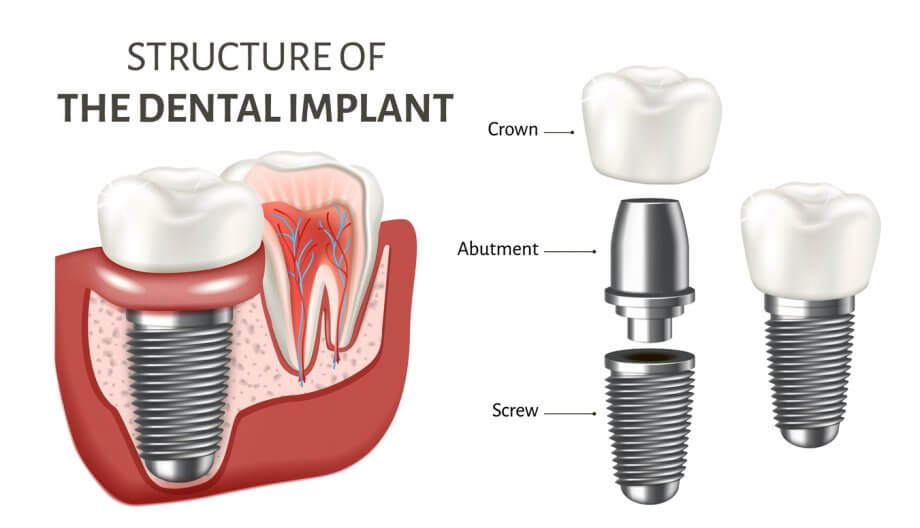
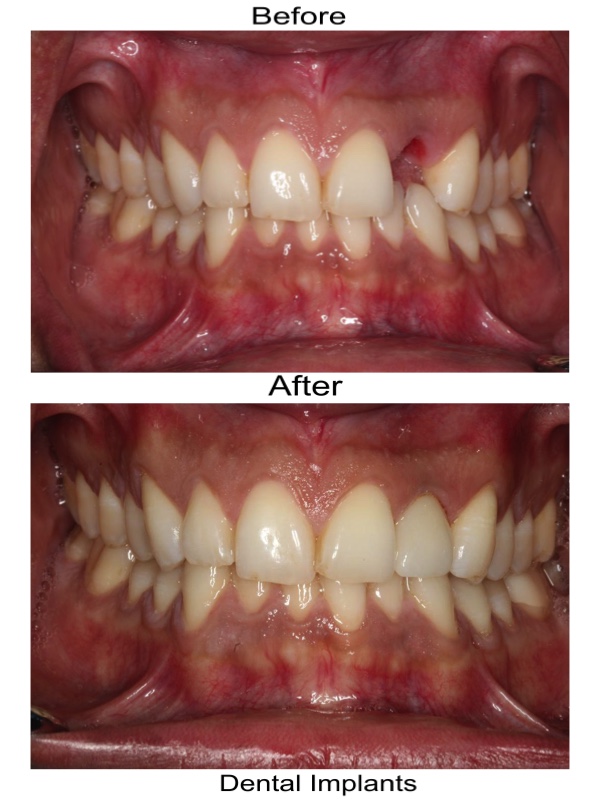
Your journey toward single dental implants begins with a comprehensive consultation with a dental professional. During this initial assessment, your dentist will evaluate your oral health, discuss your treatment goals, and determine if you’re a suitable implant candidate. Advanced imaging techniques, such as X-rays and CT scans, may be used to assess bone density and plan the precise placement of the implant.
The implant procedure is a carefully orchestrated process performed under local anesthesia or IV Sedation for your comfort. During the surgery, your dentist will surgically place the implant into the jawbone at the predetermined location. This requires precise techniques to ensure proper alignment and positioning. Once in place, the implant will be left to integrate, which typically takes several months.
After implant placement, a healing period is necessary to allow osseointegration to occur fully. Your dentist will provide post-operative instructions to help promote healing and reduce the risk of complications. During this time, it is vital to maintain good oral hygiene and follow any dietary restrictions outlined by your dentist. While recovery may require patience, the result—a stable and functional replacement tooth—is well worth the wait.
Once the implant has integrated with the jawbone, the final step is to attach a custom-made crown or prosthetic tooth. This restoration is meticulously designed for your natural teeth to match the color, shape, and real teeth, ensuring a seamless and aesthetically pleasing result. With your new tooth in place, you’ll enjoy renewed confidence in your smile and the ability to chew and speak easily.
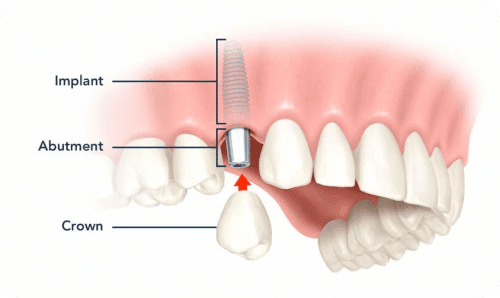
In conclusion, single dental implants offer a transformative solution for replacing missing teeth and restoring oral function. We hope this guide has provided valuable insights into the process, from initial consultation to final restoration. We encourage you to consult a qualified dental professional to discuss your options further if you’re considering single dental implants. With the proper guidance and care, you can embark on your journey toward a healthier, more confident smile.
Multiple Dental Implants
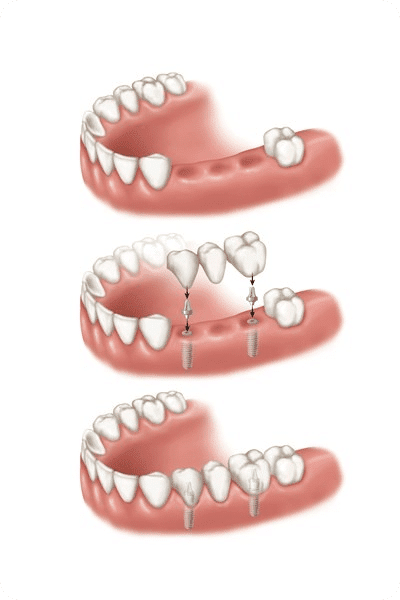
Are you struggling with multiple missing teeth and seeking a reliable solution to restore your smile and chewing function? Dental implants offer a revolutionary approach to tooth replacement, providing stability, durability, and natural aesthetics. This comprehensive guide dives into various implant options to address missing teeth, including single implants and implant bridges.
Single Implants:
Even if you’re missing just a couple of teeth, opting for a single implant at each site can prevent adjacent teeth from shifting and maintain proper alignment within the dental arch. A single implant consists of a titanium post surgically placed into the jawbone, topped with a realistic-looking crown that seamlessly blends with your natural teeth. This approach offers a long-term solution that mimics the strength and appearance of a natural tooth.
Implant Bridges:
Implant bridges are an excellent choice for replacing multiple adjacent missing teeth without needing individual implants for each tooth. A seamless row of prosthetic teeth can be securely affixed to the jaw by anchoring a bridge to two or more dental implants. This approach provides stability and durability while restoring the appearance and function of multiple missing teeth.
The selection of the most suitable implant option depends on various factors, including the number and location of missing teeth, bone density, overall oral health, and patient preferences. Consulting with a qualified implant dentist is crucial to assess your unique needs and develop a personalized treatment plan that meets your goals and expectations.
In conclusion, dental implants offer various options for replacing missing teeth, ranging from multiple implants to single implants and implant bridges. Whether you’re missing one tooth or several, implants provide a durable, natural-looking solution that enhances your smile and quality of life. Schedule a consultation with an experienced implant dentist to explore your options and take the first step toward restoring your confident smile.
Full Mouth Dental Implants
Complete mouth restoration offers comprehensive solutions for patients seeking to address extensive dental issues, whether replacing all missing teeth with implants or enhancing the aesthetics of existing teeth with veneers and crowns. This article explores two popular options for complete mouth restoration: All-on-4 implants and veneers/crowns.
1. All-on-4 Dental Implants:
All-on-4 dental implants provide a revolutionary solution for patients with extensive tooth loss or those seeking to replace failing dentition. This advanced technique strategically places four dental implants per arch, providing a stable foundation for a complete set of prosthetic teeth. The implants are strategically angled to maximize contact with available bone, often eliminating the need for bone grafting in patients with reduced jawbone density.

Key Benefits of All-on-4 Implants:
– **Immediate Function:** In many cases, temporary prosthetic teeth can be attached to the implants on the same day as the surgery, allowing patients to enjoy restored aesthetics and function immediately.
– **Improved StabilityAll-on-4 implants provide exceptional stab stability to prevent issues commonly associated with traditional dentures, such as slippage, discomfort, and difficulty chewing.
Bone Preservation:** Implants help preserve bone density and maintain facial structure by stimulating the underlying jawbone, preventing the sunken appearance often seen with extensive tooth loss.
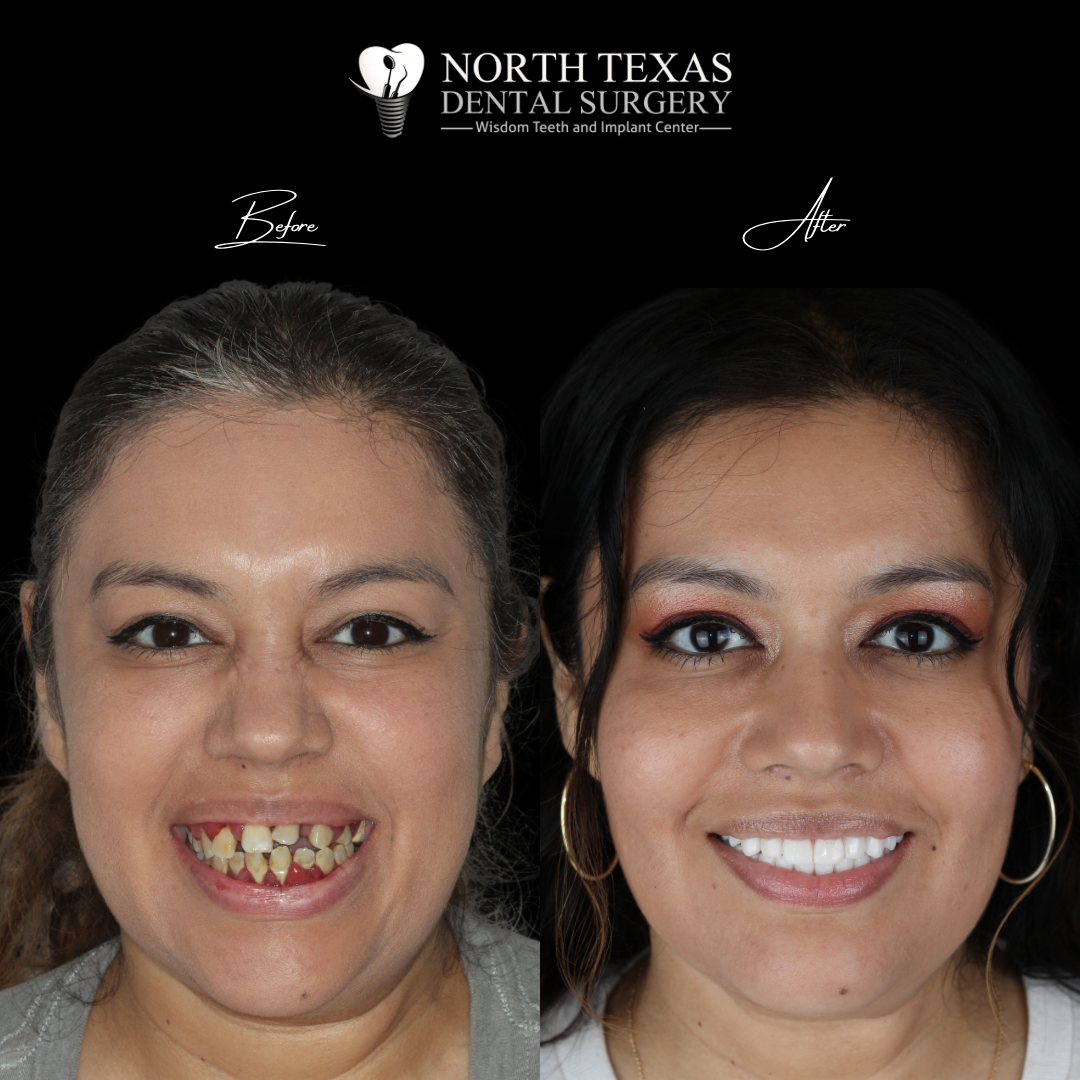

2. Veneers and Crowns for Full Mouth Restorations:
Veneers and crowns offer a non-invasive yet highly effective solution for enhancing the appearance of existing teeth in complete mouth restoration. Veneers are thin shells of porcelain or composite resin custom-designed to cover the front surface of teeth, concealing imperfections such as stains, chips, cracks, and irregularities in size or shape. On the other hand, crowns encase a tooth’s entire visible portion, restoring its strength, function, and aesthetics.

Key Benefits of Veneers and Crowns:
– **Cosmetic Enhancement:** Veneers and crowns can dramatically improve the appearance of teeth, creating a uniform, symmetrical smile with natural-looking results.
– **Strength and Durability:** Both veneers and crowns are made from durable materials that withstand normal biting and chewing forces, providing long-lasting results.
– **Customization:** Each veneer and crown is custom-made to match your natural teeth’ color, shape, and size, ensuring a seamless blend with your smile.
Choosing the Right Option:
The decision between All-on-4 implants and veneers/crowns for complete mouth restoration depends on various factors, including the condition of your teeth, jawbone health, budget, and desired outcome. Consulting with a skilled prosthodontist or implant dentist is essential to assess your unique needs and goals and determine the most appropriate treatment plan.
Conclusion:
Complete mouth restoration offers transformative solutions for patients seeking to rejuvenate their smiles and improve oral function. Whether you opt for All-on-4 dental implants to replace missing teeth or choose veneers and crowns to enhance the appearance of existing teeth, restoring your smile can profoundly impact your confidence and quality of life. Schedule a consultation with a qualified dental professional to explore your options and embark on the journey to a radiant, confident smile.

